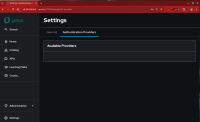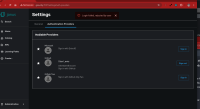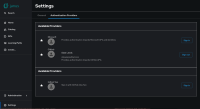-
Bug
-
Resolution: Done
-
Blocker
-
None
-
None
-
3
-
False
-
-
False
-
-
-
RHDH Dynamic Plugins 3269, RHDH Dynamic Plugins 3270
Description of problem:
When supplying authentication providers via dynamic plugins, the "Authentication Providers" tab in the user settings is blank. This is due to the way this tab is implemented, it will only show list entries for "known" providers that are defined in the core-plugin-api package. Providers with ids outside of this will not be listed.
Prerequisites (if any, like setup, operators/versions):
Use the example provided as part of RHIDP-5484 using the image from this PR
Steps to Reproduce
Deploy the example and sign-in, go to "Settings" -> "Authentication Providers"
Actual results:
No providers will be listed, like so:
Expected results:
The LDAP authentication provider should be listed with a "sign out" button.
Reproducibility (Always/Intermittent/Only Once):
always
Build Details:
Additional info (Such as Logs, Screenshots, etc):
- relates to
-
RHDHPLAN-740 dynamic authentication provider plugins
-
- In Progress
-
- links to



